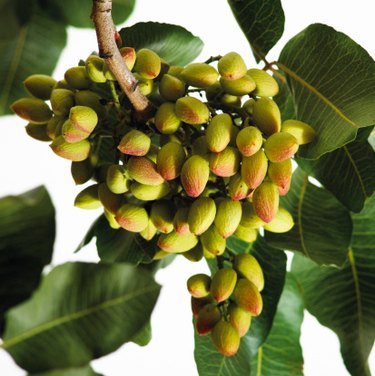
The pistachio lover has many choices when considering a nut purchase — red shells, tan shells, no shells, raw, roasted, flavored with salt, honey, chili, hickory, cilantro, rosemary, toffee, ginger, soy, garlic, onion, lemon, lime, and chocolate. Even plain! And that's where the flavor of the actual nut becomes a major factor. Today, pistachios remain one of the most popular nuts for people in many countries.The world's major pistachio-producing areas are Iran, Turkey, and California.
Turkish Pistachios
Currently, Turkey is the main supplier of imported pistachios in the United States. Turkish "Antep" Pistachios are one of the oldest varieties available. Smaller than other varieties, they are crunchy and savory with a touch of sweetness. Baby boomers first began to enjoy them in popular pistachio ice cream starting in the 1940's. These nuts are also used in baklava, nougat, and Turkish Delight, a type of candy.
California Pistachios
The pistachio tree thrives under hot dry conditions and can even endure drought, but it cannot tolerate excessive dampness and high humidity. Because of this, California is an ideal environment for pistachio cultivation. California is the only state that produces pistachios on a commercial scale — about 150,000 tons annually. American importers of Turkish and Iranian pistachios describe their California counterparts as beautiful but tasteless. The California producers claim their pistachios taste about the same as the Middle Eastern varieties but are larger, fresher and easier to open. In advertisements, Californians brag about their pistachios' size, freshness, and nutritional value rather than taste. These nuts cpme with additional flavorings and coatings, with chocolate as a big favorite. During harvest the shells often develop stains and blemishes and appear unappetizing. Some US importers use a non-toxic red vegetable dye to camouflage the nuts and make them more attractive.
Iranian Pistachios
Pistachios are native to Iran, where farmers continue the thousand-year-old tradition of their cultivation. During ancient times, Iranians thought pistachios were aphrodisiacs. Eventually, pistachios began to ship to Italy and from there spread to other Mediterranean countries. Pistachio nuts from Iran have the richest and most intense flavor of all available varieties. They grow in a range of sizes, including round, jumbo, and long. The deeper the shade of green, the better the nuts. However, they are very hard to find in the US because of import duty of as much as 300%.